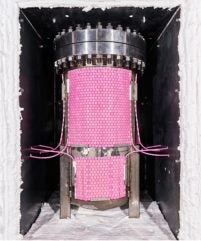
US-based Natura Resources has entered into a partnership with the Texas Produced Water Consortium (TxPWC) at Texas Tech University to look at the deployment of Natura’s liquid-fuelled molten salt reactor (LF-MSR) technology to power the Permian Basin.
The partnership, dubbed Fortifying the Future, provides the opportunity to deploy Natura’s LF-MSR technology to supply additional sources energy paired with produced water treatment facilities to supply two new forms of critical resources for the state of Texas.
“Natura has deep-seated roots in the Permian Basin oil and gas industry, and we are thrilled at the opportunity to bring our molten salt reactor technology to the Permian to meet the critical needs for both energy and water,” said Doug Robison, Founder and President of Natura Resources.
Natura said the partnership with the TPWC and the expected issue in September of a construction permit for its first reactor deployment at Abilene Christian University are both evidence of the rapid pace at which Natura is developing its LF-MSR technology.
“This partnership is a significant opportunity to demonstrate the potential for expendable additional sources of electricity and water in a state facing demands regarding future resource adequacy, borne in part by immense economic success on a national and global scale,” said Rusty Smith, Executive Director of the TPWC.
TPWC was created by the Texas Legislature in 2021 as the state’s premier produced water research consortium focused on the potential for beneficial uses of treated produced water outside the oil and gas industry. The consortium is specifically tasked with providing the legislature and state agencies guidance and recommendations on policies that could encourage a system of beneficial use that is both environmentally safe and economically viable.
“This partnership highlights Texas Tech’s long-standing commitment to conducting impactful research, especially as it relates to the efficient and reliable utilisation of our state’s resources.” said Texas Tech President Lawrence Schovanec.
Natura Resources says its MSRs are liquid-fuelled meaning fissile uranium tetrafluoride (UF4) material is dissolved in a molten salt mixture. As this molten fuel salt moves through the reactor core, a fission reaction takes place producing energy and temperatures over 600°C. To shut down the reactor the fuel salt is drained into a drain tank located directly below the reactor core.
The geometry of the drain tank and lack of moderator ensure that the fission process ceases. Once in the drain tank the fuel salt can be externally heated to remain in liquid form, or it can be allowed to cool and return to a solid state once temperatures drop below 450°C.The primary heat removal system transfers the heat generated in the fission process through a cooling loop and to a separate process fluid that can be then used for a wide variety of end use applications.
MSRs are flexible in their potential end use applications. The secondary heat removal system will provide a heat transfer fluid with temperatures exceeding 600°C that can be utilised for a variety of applications, including, but not limited to: electricity generation, high process heat applications such as hydrogen or steel production and water desalination. “The exact specifications for the secondary coolant system and the corresponding balance of plant are highly dependent on the end use applications and designed to meet customer requirements.”






